How to cite this page Comment citer cette page
Items
In item set
People
-
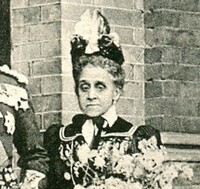 Buller, Audrey Wife of Redvers Buller.
Buller, Audrey Wife of Redvers Buller. -
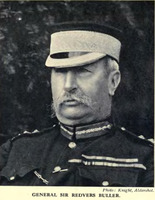 Buller, Redvers British army officer who fought in several colonial conflicts across the globe in the second half of the nineteenth-century, including China, Canada, West Africa, East Africa, and South Africa.
Buller, Redvers British army officer who fought in several colonial conflicts across the globe in the second half of the nineteenth-century, including China, Canada, West Africa, East Africa, and South Africa. - Burgess, Marti
-
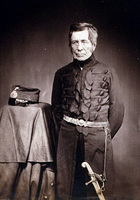 Burgoyne, John Fox British Army officer who fought in a number of nineteenth century conflicts, including the Alexandria expedition in 1807 and Battle of New Orleans in 1815.
Burgoyne, John Fox British Army officer who fought in a number of nineteenth century conflicts, including the Alexandria expedition in 1807 and Battle of New Orleans in 1815. -
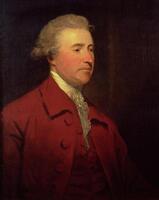 Burke, Edmund Anglo-Irish statesman, political theorist and conservative philosopher in the eighteenth century.
Burke, Edmund Anglo-Irish statesman, political theorist and conservative philosopher in the eighteenth century. -
Burnard, Neville Northey British sculptor in the nineteenth century. Burnard's patron, the Cornish MP Sir Charles Lemon, 2nd Baronet had an indirect connection to British slavery through his father Sir William Lemon, 1st Baronet, who was a mortgage holder of the Belmont estate in St Vincent.
-
Burton, Edson Writer, historian, programme-curator and performer based in Bristol.
-
Butler, Vincent Scottish sculptor in the twentieth and early twenty-first centuries.
-
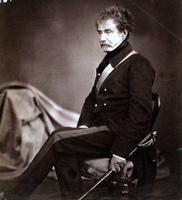 Campbell, Colin, 1st Baron Clyde British Army officer and Commander-in-Chief of India from 1857 to 1861. Campbell fought in several colonial conflicts in the Caribbean and Asia during the nineteenth century, and was involved in the suppression of the Demerara slave rebellion in 1823 and the Indian rebellion in 1857.
Campbell, Colin, 1st Baron Clyde British Army officer and Commander-in-Chief of India from 1857 to 1861. Campbell fought in several colonial conflicts in the Caribbean and Asia during the nineteenth century, and was involved in the suppression of the Demerara slave rebellion in 1823 and the Indian rebellion in 1857. -
Campbell, Thomas Scottish sculptor active in the nineteenth century.
-
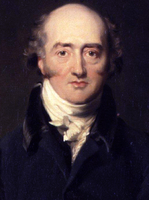 Canning, George British Prime Minister, statesman, and pro-slavery politician in the late eighteenth and early nineteenth centuries. Canning was an important opponent of the abolition of slavery in the 1820s, and his views on the subject have been discussed at length by the historian Michael Taylor. As Member of Parliament for Liverpool between 1812 and 1823, one of his major political patrons had been the absentee Guyanese slave-owner and politician John Gladstone (1764-1851). Canning also enjoyed a close personal and political friendship with Charles Rose Ellis, Lord Seaford (1771-1845), who was a leading figure in the West India interest and an absentee Jamaican slave-owner. As Foreign Secretary and Leader of the House of Commons, Canning was responsible for thwarting Thomas Fowell Buxton's early efforts to introduce a plan for abolition in May 1823. His opposition to emancipation was often couched explicitly in ideas of racial inferiority: in a speech to the Commons on amelioration in March 1824, for instance, he argued 'In dealing with the n****, Sir, we must remember that we are dealing with a being possessing the form and strength of a man, but the intellect only of a child'.
Canning, George British Prime Minister, statesman, and pro-slavery politician in the late eighteenth and early nineteenth centuries. Canning was an important opponent of the abolition of slavery in the 1820s, and his views on the subject have been discussed at length by the historian Michael Taylor. As Member of Parliament for Liverpool between 1812 and 1823, one of his major political patrons had been the absentee Guyanese slave-owner and politician John Gladstone (1764-1851). Canning also enjoyed a close personal and political friendship with Charles Rose Ellis, Lord Seaford (1771-1845), who was a leading figure in the West India interest and an absentee Jamaican slave-owner. As Foreign Secretary and Leader of the House of Commons, Canning was responsible for thwarting Thomas Fowell Buxton's early efforts to introduce a plan for abolition in May 1823. His opposition to emancipation was often couched explicitly in ideas of racial inferiority: in a speech to the Commons on amelioration in March 1824, for instance, he argued 'In dealing with the n****, Sir, we must remember that we are dealing with a being possessing the form and strength of a man, but the intellect only of a child'. -
Caravanniez, Alfred French sculptor in the nineteenth and early twentieth centuries.
-
Cardot, Jean Sculptor, second Grand Prix de Rome in 1956, teacher at the Beaux-Arts in Lyon and Paris, elected to the Académie des Beaux-Arts in 1983. He created several statues of personalities for Paris : Churchill, de Gaulle and Jefferson. He was also a Beaux-Arts inspector for the city of Paris.
-
Cardot, Jean Second grand prix de Rome en 1956, enseignant aux Beaux-Arts de Lyon puis de Paris, élu à l’Académie des Beaux-Arts en 1983. Il réalise plusieurs statues de personnalités destinées à
-
Carew, John Edward Irish sculptor active in the nineteenth century.
-
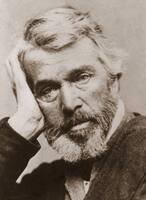 Carlyle, Thomas Scottish essayist, historian and philosopher (1795-1881). Carlyle's essay 'Occasional Discourse on the Negro Question', first published in 1849 and republished in 1853 with a new title, expounded a defence of slavery on the grounds of racial inferiority. He later led the Eyre Defence and Aid Fund to defend Governor John Eyre's violent repression of the Morant Bay Rebellion in Jamaica in 1865. Carlyle's thought had a wide-ranging influence both during and after his life. Other nineteenth-century proslavery intellectuals such as George Fitzhugh and John Mitchel, the latter of whom Carlyle met in the mid-1840s, claimed inspiration from his work.
Carlyle, Thomas Scottish essayist, historian and philosopher (1795-1881). Carlyle's essay 'Occasional Discourse on the Negro Question', first published in 1849 and republished in 1853 with a new title, expounded a defence of slavery on the grounds of racial inferiority. He later led the Eyre Defence and Aid Fund to defend Governor John Eyre's violent repression of the Morant Bay Rebellion in Jamaica in 1865. Carlyle's thought had a wide-ranging influence both during and after his life. Other nineteenth-century proslavery intellectuals such as George Fitzhugh and John Mitchel, the latter of whom Carlyle met in the mid-1840s, claimed inspiration from his work. -
Carpentière, Andries English sculptor of French or Flemish descent working in Britain at the beginning of eighteenth century.
-
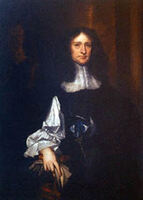 Carteret, George Royalist statesman in Jersey and one of the original lords proprietor of the British colony of Carolina. Carteret was one of the six founding members of the Company of Royal Adventurers into Africa, an early predecessor of the Royal African Company (RAC), and later became a consultant and investor in the RAC.
Carteret, George Royalist statesman in Jersey and one of the original lords proprietor of the British colony of Carolina. Carteret was one of the six founding members of the Company of Royal Adventurers into Africa, an early predecessor of the Royal African Company (RAC), and later became a consultant and investor in the RAC. -
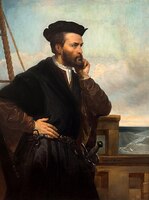 Cartier, Jacques French maritime explorer in Canada in the sixteenth century
Cartier, Jacques French maritime explorer in Canada in the sixteenth century -
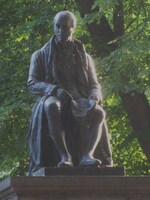 Cartwright, John English naval officer and political reformer in the eighteenth and early nineteenth centuries.
Cartwright, John English naval officer and political reformer in the eighteenth and early nineteenth centuries. -
Cartwright, Thomas English stonemason and sculptor
-
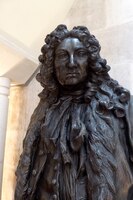 Cass, John English slave-trader, politician and philanthropist in the seventeenth and early eighteenth centuries. Cass was a member of the Court of Assistants of the Royal African Company from 1705 and made substantial investments in the Company. Cass also served as a Member of Parliament from 1710 to 1715.
Cass, John English slave-trader, politician and philanthropist in the seventeenth and early eighteenth centuries. Cass was a member of the Court of Assistants of the Royal African Company from 1705 and made substantial investments in the Company. Cass also served as a Member of Parliament from 1710 to 1715. -
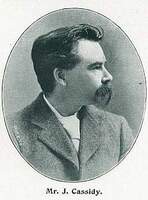 Cassidy, John Irish sculptor who worked in Manchester in the nineteenth and twentieth centuries. Cassidy is probably most well known for sculpting the statue of the slave-trader Edward Colston for Bristol in 1895, but he also produced other colonial works, including the two statues of John and Enriqueta Rylands in Manchester's John Rylands Library.
Cassidy, John Irish sculptor who worked in Manchester in the nineteenth and twentieth centuries. Cassidy is probably most well known for sculpting the statue of the slave-trader Edward Colston for Bristol in 1895, but he also produced other colonial works, including the two statues of John and Enriqueta Rylands in Manchester's John Rylands Library. -
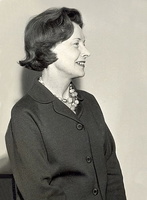 Castle, Barbara British Labour Party politician who was Member of Parliament for Blackburn from 1945 to 1979, making her one of the longest-serving female MPs in British history. Castle was a supporter of both the Movement for Colonial Freedom and the Anti-Apartheid Movement in the United Kingdom, and was a leading figure in protesting the British government's conduct during the Mau Mau rebellion in Kenya (1952-1960). Castle visited Kenya in 1954 during the rebellion and made a famous speech in Parliament exposing governmental deception over the Hola Massacre in 1959.
Castle, Barbara British Labour Party politician who was Member of Parliament for Blackburn from 1945 to 1979, making her one of the longest-serving female MPs in British history. Castle was a supporter of both the Movement for Colonial Freedom and the Anti-Apartheid Movement in the United Kingdom, and was a leading figure in protesting the British government's conduct during the Mau Mau rebellion in Kenya (1952-1960). Castle visited Kenya in 1954 during the rebellion and made a famous speech in Parliament exposing governmental deception over the Hola Massacre in 1959. -
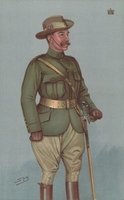 Cavendish, Charles British politician and soldier who was Inspector General of Imperial Yeomanry during the Second Boer War.
Cavendish, Charles British politician and soldier who was Inspector General of Imperial Yeomanry during the Second Boer War. -
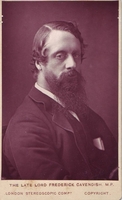 Cavendish, Frederick British politician in the nineteenth century, whose appointment as the Chief Secretary for Ireland in 1882 was cut short by his murder by Irish republicans, known as the Phoenix Park Murders.
Cavendish, Frederick British politician in the nineteenth century, whose appointment as the Chief Secretary for Ireland in 1882 was cut short by his murder by Irish republicans, known as the Phoenix Park Murders. -
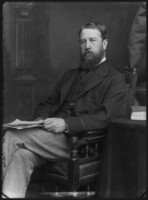 Cavendish, Spencer, 8th Duke of Devonshire British politician in the nineteenth century. Cavendish served in a number of government positions, including Secretary of State for War (1866; 1882-1885), Chief Secretary for Ireland (1871-1874), and Secretary of State for India (1880-1882).
Cavendish, Spencer, 8th Duke of Devonshire British politician in the nineteenth century. Cavendish served in a number of government positions, including Secretary of State for War (1866; 1882-1885), Chief Secretary for Ireland (1871-1874), and Secretary of State for India (1880-1882). -
Caymitte, Woodly Haitian sculptor, known as Filipo
-
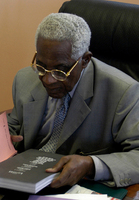 Césaire, Aimé French-speaking poet, author and politician from Martinique, founder of the Négritude movement. Césaire was deputy for Martinique in the French National Assembly (1945-1993), president of the Martinique Regional Council (1983-1988) and mayor of Fort-de-France. He fought for departmentalization and autonomy through the Parti Progressiste Martiniquais, which he founded in 1958. He led an ambitious cultural policy in Fort-de-France, which included transforming the city's urban fabric. Césaire and his wife Suzanne Roussi (1915-1966) founded the anti-colonial and surrealist literary magazine Tropiques (1941 to 1945). Césaire's most famous works include Cahier d'un retour au pays natal (1939), Discours sur le colonialisme (1955) and Une Tempête (1969). His work has been a major source of inspiration for anti-colonial thinkers the world over, notably Frantz Fanon (1925-1961), a former student of Césaire, and Édouard Glissant (1928-2011).
Césaire, Aimé French-speaking poet, author and politician from Martinique, founder of the Négritude movement. Césaire was deputy for Martinique in the French National Assembly (1945-1993), president of the Martinique Regional Council (1983-1988) and mayor of Fort-de-France. He fought for departmentalization and autonomy through the Parti Progressiste Martiniquais, which he founded in 1958. He led an ambitious cultural policy in Fort-de-France, which included transforming the city's urban fabric. Césaire and his wife Suzanne Roussi (1915-1966) founded the anti-colonial and surrealist literary magazine Tropiques (1941 to 1945). Césaire's most famous works include Cahier d'un retour au pays natal (1939), Discours sur le colonialisme (1955) and Une Tempête (1969). His work has been a major source of inspiration for anti-colonial thinkers the world over, notably Frantz Fanon (1925-1961), a former student of Césaire, and Édouard Glissant (1928-2011). -
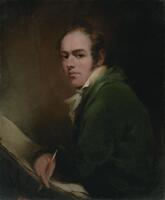 Chantrey, Francis Legatt English sculptor active in the early nineteenth century. Some of his notable colonial works include the statue of Edward Hyde East in Kolkata and the equestrian statue of Thomas Munro in Chennai. Chantrey also executed a number of monuments to figures with connections to transatlantic slavery, including a monument to Isaac Hawkins Browne in Badger, Shropshire, a monument to John 'Mad Jack' Fuller in Brightling, Sussex, and a bust of Charles Long, 1st Baron Farnborough, which is now in the collections of the National Gallery.
Chantrey, Francis Legatt English sculptor active in the early nineteenth century. Some of his notable colonial works include the statue of Edward Hyde East in Kolkata and the equestrian statue of Thomas Munro in Chennai. Chantrey also executed a number of monuments to figures with connections to transatlantic slavery, including a monument to Isaac Hawkins Browne in Badger, Shropshire, a monument to John 'Mad Jack' Fuller in Brightling, Sussex, and a bust of Charles Long, 1st Baron Farnborough, which is now in the collections of the National Gallery. -
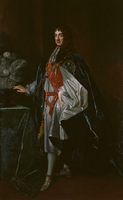 Charles II King of Scotland (1649-1651) and King of England, Scotland, and Ireland (1660-1685). Charles granted a royal charter to the slave-trading Company of Royal Adventurers of England Trading into Africa and made investments in the company. He was later founder and patron of the Royal African Company alongside his brother the Duke of York.
Charles II King of Scotland (1649-1651) and King of England, Scotland, and Ireland (1660-1685). Charles granted a royal charter to the slave-trading Company of Royal Adventurers of England Trading into Africa and made investments in the company. He was later founder and patron of the Royal African Company alongside his brother the Duke of York. -
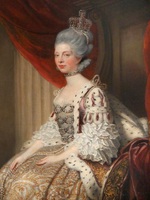 Charlotte of Mecklenburg-Strelitz Queen consort of Great Britain and Ireland (1761-1818)
Charlotte of Mecklenburg-Strelitz Queen consort of Great Britain and Ireland (1761-1818) -
Charpentier, Hector Martinican painter and sculptor
-
Chatham, Herbert British sculptor active in the early twentieth century.
-
Chaumot, Georges French sculptor in the twentieth century
-
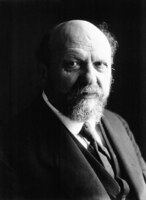 Chautemps, Emile Minister of the Colonies (1895) and the Marine (1914).
Chautemps, Emile Minister of the Colonies (1895) and the Marine (1914). -
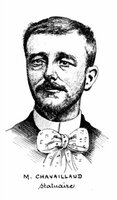 Chavalliaud, Léon-Joseph French sculptor in the nineteenth and twentieth centuries.
Chavalliaud, Léon-Joseph French sculptor in the nineteenth and twentieth centuries. -
Cheere, Henry English sculptor in the eighteenth century.
-
Chiquet, Maxime French sculptor active in the twentieth century.
-
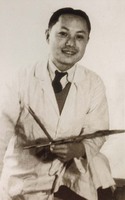 Chongren, Zhang Chinese sculptor in the twentieth century and friend of the Belgian cartoonist Hergé.
Chongren, Zhang Chinese sculptor in the twentieth century and friend of the Belgian cartoonist Hergé. -
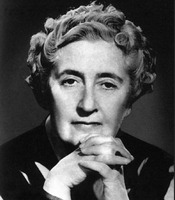 Christie, Agatha Mary Clarissa, née Miller British detective fiction writer, creator of the characters Hercule Poirot and Miss Marple. She was married twice, the second time to the archaeologist Max Mallowan, whom she accompanied on several field trips in Iraq, Syria, and other places in the Middle East. These trips were enabled by the fact of British imperialism in the region. They were also associated with the cultural predation of twentieth-century archaeology. Christie's husband, Max Mallowan, was a devoted admirer of Gertrude Bell, whose enormous political influence on mandatory Iraq remains a contentious legacy. As the first director of the Iraq Museum, Bell designed Iraq's first antiquities law, which allowed archaeological excavators to remove 50% of their finds; these were priceless antiquities currently housed in museums in the West. Many of Christie's widely loved and enjoyed detective novels are set in Middle Eastern locales. They are replete with Orientalist stereotypes.
Christie, Agatha Mary Clarissa, née Miller British detective fiction writer, creator of the characters Hercule Poirot and Miss Marple. She was married twice, the second time to the archaeologist Max Mallowan, whom she accompanied on several field trips in Iraq, Syria, and other places in the Middle East. These trips were enabled by the fact of British imperialism in the region. They were also associated with the cultural predation of twentieth-century archaeology. Christie's husband, Max Mallowan, was a devoted admirer of Gertrude Bell, whose enormous political influence on mandatory Iraq remains a contentious legacy. As the first director of the Iraq Museum, Bell designed Iraq's first antiquities law, which allowed archaeological excavators to remove 50% of their finds; these were priceless antiquities currently housed in museums in the West. Many of Christie's widely loved and enjoyed detective novels are set in Middle Eastern locales. They are replete with Orientalist stereotypes. -
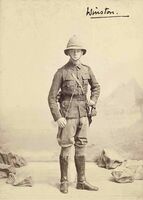 Churchill, Winston Prime Minister of the United Kingdom (1940-1945; 1951-1955) The British Empire fundamentally shaped Churchill's life and career. From 1896 to 1901, Churchill fought as a soldier in several colonial conflicts, including in India, Sudan, and South Africa. He wrote a number of books recounting his military experiences with the Empire, including The Story of the Malakand Field Force (1898), The River War (1899), London to Ladysmith via Pretoria (1900), and Ian Hamilton's March (1900). During the interwar years, Churchill held many ministerial offices and briefly served as Secretary of State for the Colonies from 1921 to 1922. Churchill's first term (1940-1945) was dominated by the Second World War and its consequences for the British Empire. His second term (1951-1955) was marked by Britain's postwar transition and conflicts over decolonisation across the globe, including the Mau Mau Rebellion and the Malayan Emergency.
Churchill, Winston Prime Minister of the United Kingdom (1940-1945; 1951-1955) The British Empire fundamentally shaped Churchill's life and career. From 1896 to 1901, Churchill fought as a soldier in several colonial conflicts, including in India, Sudan, and South Africa. He wrote a number of books recounting his military experiences with the Empire, including The Story of the Malakand Field Force (1898), The River War (1899), London to Ladysmith via Pretoria (1900), and Ian Hamilton's March (1900). During the interwar years, Churchill held many ministerial offices and briefly served as Secretary of State for the Colonies from 1921 to 1922. Churchill's first term (1940-1945) was dominated by the Second World War and its consequences for the British Empire. His second term (1951-1955) was marked by Britain's postwar transition and conflicts over decolonisation across the globe, including the Mau Mau Rebellion and the Malayan Emergency. -
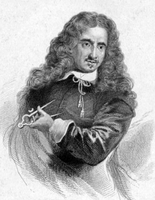 Cibber, Caius Gabriel Danish sculptor in the seventeenth century.
Cibber, Caius Gabriel Danish sculptor in the seventeenth century. -
Cibot, Élisabeth French sculptor active in the twentieth and twenty-first centuries.
-
Clapperton, Thomas John Scottish sculptor active in the twentieth century.
-
Clarke, George English sculptor active in the nineteenth century.
-
Clarke, George Somers British architect and Egyptologist in the nineteenth and twentieth centuries.
-
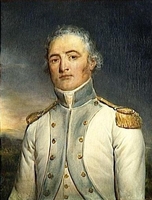 Clauzel, Bertrand French military general and colonial administrator. Clauzel was Governor-General of Algeria from 1830 to 1831 and 1835 to 1837.
Clauzel, Bertrand French military general and colonial administrator. Clauzel was Governor-General of Algeria from 1830 to 1831 and 1835 to 1837. -
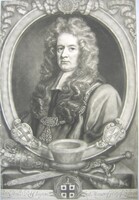 Clayton, Robert Member of the Court of Assistants to the Royal African Company (1672-1682) and Lord Mayor of London (1679-1680). Clayton also acquired a large plantation in Bermuda through his wife Martha Trott, who was the daughter of a Bermuda merchant and factor.
Clayton, Robert Member of the Court of Assistants to the Royal African Company (1672-1682) and Lord Mayor of London (1679-1680). Clayton also acquired a large plantation in Bermuda through his wife Martha Trott, who was the daughter of a Bermuda merchant and factor. -
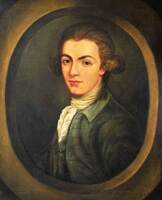 Clive, Edward British aristocrat and colonial administrator in India
Clive, Edward British aristocrat and colonial administrator in India